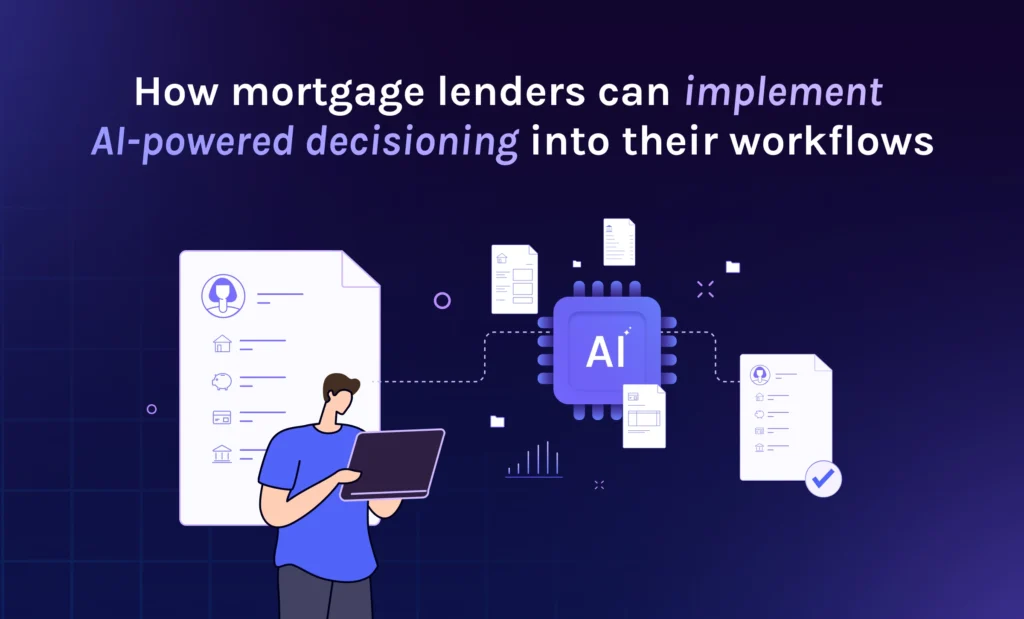How mortgage lenders can implement AI-powered decisioning into underwriting workflows

AI in financial services has evolved from a novel, promising technology to effectively become a prerequisite for mortgage lenders that want to stay competitive in a modern underwriting techscape. The mortgage lenders we at Ocrolus are meeting with on a weekly basis are increasingly focused on how best to use AI, how to implement mortgage document automation technology and how to prepare teams for the inevitable change in streamlined, automated mortgage operations.
Achieving a smooth transition to AI‑powered decisioning requires more than simply purchasing software and training employees. Lenders must first analyze every step of their underwriting process for opportunities to automate, then equip employees with tools that augment, not replace, human expertise. Finally, they need to integrate the technology with clear intent and long‑term strategy so that AI investment drives measurable, repeatable gains.
What is driving the need for AI in mortgage lending?
Rising origination costs and an increasingly competitive lending environment are pressuring lenders to become more efficient. AI‑powered data and analytics has emerged as an invaluable tool, enabling lenders to sift through vast amounts of data quickly, identify discrepancies between financial documents and better combat fraud.
Today, most financial institutions agree that AI will play a key operational role, but adopting the technology is a challenge of its own. Financial organizations need to identify the right technology partner early. Developing AI tools in‑house may appear attractive at first, but the high costs and resource‑intensive nature of in‑house AI push most lenders to select an external vendor. Partnering with an AI‑powered data and analytics platform such as Ocrolus accelerates time to value and reduces risk, so lenders can focus on what they do best: funding loans.

Managing organizational change to adopt mortgage AI with intention
Major organization‑wide changes require an intentional rollout strategy, and integrating AI into a mortgage workflow is no different. Team leaders should prioritize clear communication with employees, including why the organization is adopting AI, what benefits are expected and how individual roles may evolve. Transparent messaging builds trust and minimizes resistance no matter what the program is that you are rolling out.
Start by setting specific, quantifiable goals that the organization hopes to achieve through AI adoption. For example, cutting loan review times by 30% or reducing manual rework by half within six months. These goals become a north star that guides automation efforts, informs vendor selection and keeps every stakeholder and department aligned. For individual team members, AI adoption means less time spent on repetitive tasks and more time focused on high-impact, strategic work, enabling personal growth and stronger performance.
Pilot groups are an effective way to introduce a new technology in a controlled environment. By assembling influential team members to test the technology, pilot groups can surface issues early and streamline the broader rollout. Their feedback also helps build confidence across the organization. Success stories from the pilot phase provide tangible proof of value that encourages wider adoption.
Watch now: Managing the change to AI-driven underwriting
Processes, people and partnerships
When adopting AI‑powered solutions, financial organizations should partner with their technology provider to audit existing operations and pinpoint automation opportunities. Common targets include income calculation, data analysis and income evaluation for non‑traditional borrowers. AI also excels at identifying subtle fraud signals hidden from the human eye, giving underwriters a head start on potential risk before the underwriting process begins.
Having the right AI infrastructure is only half the equation; equipping employees with the expertise to get the most from AI is just as critical. Underwriters can upskill quickly through the free AI‑Empowered Mortgage Lending Certification course from Ocrolus. Training programs help teams interpret AI‑generated insights, understand model limitations and trace audit trails, ensuring that human judgment remains central to credit decisions.

To maximize the payoff of any AI investment, maintain an open feedback loop with your vendor partner. Share performance metrics, highlight edge cases and request model refinements where necessary. A collaborative partnership turns AI into a living system that continuously improves alongside your business needs and helps you scale in ways that would be impossible without the adoption of AI into your mortgage workflow.
Ready to bring AI into your lending operation? Book a demo today to learn how to prepare your team for the future of AI‑powered mortgage lending.
Key takeaways
- Rising origination costs and competition make AI essential for efficient mortgage underwriting
- Successful AI adoption starts with clear goals, intentional communication and pilot programs
- Strategic partnerships with AI vendors reduce cost, risk and time to value
- AI automates labor‑intensive tasks such as income calculation, data analysis and fraud detection
- Equipping underwriters with training, like Ocrolus’ AI‑Empowered Mortgage Lending Certification, maximizes ROI


